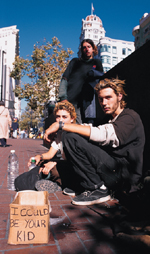|
Topic:
Teens, Lost on the Street Part 2
 Fully 88 percent of the street
teens reported panhandling to support
themselves, 62 percent reported stealing,
half said they had dealt or carried drugs
and 42 percent reported prostitution. In
contrast, only 25 percent of sheltered
teens reported panhandling, 21 percent
stealing, 17 percent selling drugs and
none engaging in prostitution. Fully 88 percent of the street
teens reported panhandling to support
themselves, 62 percent reported stealing,
half said they had dealt or carried drugs
and 42 percent reported prostitution. In
contrast, only 25 percent of sheltered
teens reported panhandling, 21 percent
stealing, 17 percent selling drugs and
none engaging in prostitution.
Health problems - including strep throat,
bladder infections, anemia, malnutrition,
venereal diseases, stomach ulcers,
hepatitis, scabies and substance abuse -
also were much more prevalent among the
street teens.
Every one of the street teens was
sexually active, compared with 75 percent
of the sheltered teens. Both groups were
aware of safe sex practices, but 46
percent of street teens and 32 percent of
sheltered teens reported having had
unprotected sex within the past six
months.
"We may speculate that for these
teenagers, the problems of living on the
street overshadow the specter of AIDS,"
the researchers said. "As one 16-year-old
explained, 'Why would I worry about dying
from AIDS in the future when I don't know
if I'm going to survive until tomorrow?'
"
What street teens did fear was being sent
home or placed in custodial care. The
fear was well grounded: Service providers
are mandated to notify parents or civil
authorities of a teen's request for
assistance, and agencies can provide
shelter for only a limited period without
such notification.
"Street teens were interested in
obtaining assistance, but they were
reluctant to make lasting commitments to
get such help," the researchers said.
"Almost no street teens expressed an
interest in family re-unification or
residential placement."
Instead, street teens were interested in
help without strings attached: a place to
sleep, a job or job training, food, a
place to clean up, medical and dental
care, and counseling.
(more info available on
07/03/02)
(source:
Stanford University News Service)
Guest:
Jim Michael
Jim is a consultant, a professional
counselor, and a Marriage and Family
Therapist (MFT) Intern. He also is a
Domestic Violence Prevention counselor at
Tarzana Treatment Center. He works in
private practice under supervision. He
also is a certified Hypnotherapist using
hypnotherapy for stress reduction,
relaxation techniques, unique dream work
understanding, and motivation for change.
He is a pre licensed member of the
California Association of Marriage and
Family Therapists (CAMFT), and is on the
board of directors of the Los Angeles
CAMFT (LA CAMFT) and the Lesbian and Gay
Psychotherapy Association of Southern
California (LAGPA). He has won awards for
outstanding service for his work in the
field in Domestic Violence Prevention.
He received his education, training and
professional experience in psychology,
personal training and hypnosis in the
greater Los Angeles, CA area. He earned
his Master’s degree in Counseling
Psychology from the University of Santa
Monica. He earned his Certification in
Hypnotherapy from the New Focus Institute
for Hypnotherapy.
While most of his undergraduate degree
was obtained at the University of Arizona
(UA) in Tucson, AZ, he graduated from
Ryokan College with a Bachelor’s Degree
in Human Behavior. He also has a
certification in Stress Management and
has a strong interest in the “mind/body”
(psychoneuroimmunology) connection.
Through his experiences and education,
he has come to a holistic,
self-actualizing focus of Therapy, one
which includes the body, the mind, the
heart, and the soul (Psyche actually
means “spirit” or “soul” and the word
“Psychology” actually has diverged from
it’s root word and means the study of
“mental processes” and “human behavior”).
From this perspective, he views you as
the one with the answers to your
questions. He can show you things,
provide tools for you to use, but
ultimately it is you who holds the key,
the answers to your life and what you
want.
Website:
www.jimmichael.com
|
